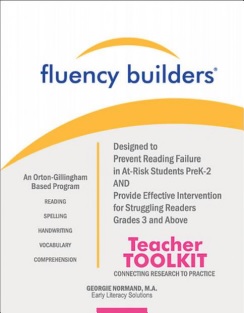the meaning of the text. There is sometimes a tendency to add prepositions and articles – even in a simple sentence like the following:
The cat went up the tree. Might be read as The cats went up into a tree. or The cat will go to the trees. Notice that the above examples also show changes in tense and plurality.
LACK OF PROSODY
Problems with prosody (appropriate pacing, expression and phrasing) may be the result of poor decoding and missed punctuation cues. The student may read slowly and deliberately, sounding out words that should be instantly recognized, or may read quite fast, scrambling words together and creating non words without noticing. Pacing may be uneven and punctuation almost completely ignored. Frequent and inappropriate pausing is common.
Placing commas and periods where they do not exist, and missing these important cues where they do exist dramatically interferes with comprehension of text. Students with dyslexia will often combine the ending and beginning of two sentences instead of acknowledging a period between the two, totally missing the meaning intended by the author. The following is an example using an excerpt from National Geographic Kids Level 1 Reader titled Frogs by Elizabeth Carney, 2009.
But some frogs live in trees. Some even live in the desert. Frogs can be found all over the world. Wherever they live, that's their habitat.
The student may read the above passage in the following way:
But some frogs live in trees. Some even live. In the desert frogs can be found all over the world wherever they live. That's their habitat.
This student will not even realize that reading it this way does not make sense or changes the author's intended meaning. Students who read this way have very weak meta-cognitive and/or self-monitoring strategies while reading. Their reading may be choppy, fast and then slow, with no attention to punctuation.
WEAK COMPREHENSION/RETELLING/ THE WRITING PROCESS
They will usually exhibit poor reading comprehension and great difficulty organizing ideas in preparation for written expression. Composing more than the simplest sentences may be almost impossible. Their weak spelling skills will continue without intervention. When retelling stories, they might begin in the middle of the story and have trouble retelling in sequence. Many of these students have excellent oral comprehension and some are able to develop compensatory skills with and without receiving accommodations in school.
As school becomes harder and the student feels more and more left behind, some may develop behavior problems, become depressed or angry, and/or have low self-esteem. Early intervention is the most important way we can help them. •

Excerpt from the Fluency Builders Teacher TOOLKIT (Fluency Builders Dyslexia Kit). earlyliteracysolutions.com. Since every student with dyslexia has a unique profile, the observations in this excerpt will vary from student to student. Some of the examples above are taken from research by Alves et al. (2017), Friedman & Coltheart (2018), Hanley (2017), Jones, Castles, & Kohnen (2011).
References
- Alves, L.M., Reis, C., Pinheiro, A., Capellini, S., Lalain, M., Ghio, A. (2017). Prosodic aspects of reading in children with dyslexia. HAL Archives-Ouvertes. HAL Id: hal-01619599.
- Friedman, N., & Coltheart, M. (2018). Types of developmental dyslexia. In A. Bar-On & D. Ravid (Eds.) Handbook of Communication Disorders: Theoretical, Empirical, and Applied Linguistic Perspectives. Berlin, Boston: De Gruyter Mouton.
- Hanley, J.R. (2017). Is there just one dyslexic reader? Evidence for the existence of distinct dyslexic subgroups. Current Developmental Disorders Reports, 4, 101-107.
- Jones, K., Castles, A., & Kohnen, S. (2011). Subtypes of developmental reading disorders: Recent developments and directions for treatment. Acquiring Knowledge in Speech, Language and Hearing (ACQ), 13(2).
- Kida, A.S.B., Ávila, C.R.B., & Capellini, S.A. (2016). Reading comprehension assessment through retelling: Performance profiles of children with dyslexia and language-based learning disability. Frontiers in Psychology, 7, Article 787.
- Lauterbach, A.A., Park, Y., & Lombardino, L.J. (2018). The roles of cognitive and language abilities in predicting decoding and reading comprehension: Comparisons of dyslexia and specific language impairment. Annals of Dyslexia, 67, 201-218.
- Raschle, N.M., Becker, B.L.C., Smith, S., Fehlbaum, L.V., Wang, Y., & Gaab, N. (2017). Investigating the influences of language delay and/or familial risk for dyslexia on brain structure in 5-year-olds. Cerebral Cortex, 27(1), 764-776.
- Ring, J., & Black, J.L. (2018). The multiple deficit model of dyslexia: What does it mean for identification? Annals of Dyslexia. https://doi.org/10.1007/s11881-018-0157-y
- Spencer, M., Wagner, R. K., Schatschneider, C., Quinn, J. M., Lopez, D., & Petscher, Y. (2014). Incorporating RTI in a hybrid model of reading disability. Learning Disability Quarterly, 37 (3), 161–171
ABOUT THE AUTHOR:

Georgie Normand, M.A. holds a Master's degree in Reading Education and has spent many years working with students with dyslexia. She is the founder of Early Literacy Solutions and the author of the OrtonGillingham-based Fluency Builders Dyslexia Program (earlyliteracysolutions.com). Designed for parents, tutors, and teachers, the Fluency Builders program utilizes the latest neuroscience in dyslexia. These new studies found that dyslexia is not a one-sizefits-all learning disability. Georgie has also developed the Certified Dyslexia Practitioner Program, a professional learning program that trains teachers and tutors to identify and succeed with multiple dyslexia profiles. Contact her at georgienormand@earlyliteracysolutions.com